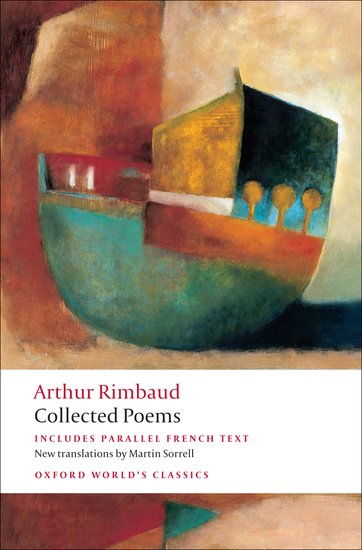
In this month’s Oxford World’s Classics reading list, we decided to celebrate National Poetry Month by selecting some of our bilingual poetry editions. In each of the below books, the poems are laid out as parallel texts, with the original language on the left and the English translation on the right. This means that you can enjoy the works either in the original language, in translation, or even compare the two. Do you have another favourite non-English language poet? Let us know in the comments below.
Arthur Rimbaud – Collected Poems
Rimbaud is the enfant terrible of French literature, the precocious genius whose extraordinary poetry is revolutionary in its visionary, hallucinatory content and its often liberated forms. He wrote all his poems between the ages of about 15 and 21, after which he turned his back on family, friends, and France to roam the world. In his final years he was a trader in the Horn of Africa. Out of the brief, colourful life and the poetry of sensory wildness has been created the myth of Rimbaud, an enduring icon of youth, rebellion, and freedom. But behind the myth lies a poetic adventure of high ambition and painful rigour, poignant yet heroic. Rimbaud is one of the greatest French poets of all times.
Federico Garcia Lorca – Selected Poems
Federico García Lorca is perhaps the most celebrated of all twentieth-century Spanish writers, known not only for his plays but also for several collections of poems published both in his short lifetime and after. Lorca’s poetry is steeped in the land, climate, and folklore of his native Andalusia, though he writes memorably of New York and Cuba too. Often in modernist idiom, and full of startling imagery, he evokes a world of intense feelings, silent suffering, and dangerous love.
Stéphane Mallarmé – Collected Poems and Other Verse
Stéphane Mallarmé was the most radically innovative of nineteenth-century poets. His writings, with their richly sensuous texture and air of slyly intangible mystery, perplexed or outraged many early readers; yet no writer has more profoundly influenced the course of modern poetry – in English as well as in French. In both form and content, his poems created new ways of conveying existential doubt, fragmentation, and discontinuity.
Rainer Maria Rilke – Selected Poems
Rainer Maria Rilke (1875-1926) is one of the leading poets of European Modernism, and one of the greatest twentieth-century lyric poets in German. From The Book of Hours in 1905 to the Sonnets of Orpheus written in 1922, his poetry explores themes of death, love, and loss. He strives constantly to interrogate the relationship between his art and the world around him, moving from the neo-romantic and the mystic towards the precise craft of expressing the everyday in poetry.

Editorial censorship has long obscured the true form and content of the Elegies, which were inspired by Goethe’s sexual liberation in Italy and his love for the woman he took as his unofficial wife on his return to Germany. They are here presented as Goethe boldly conceived them together with the long-surpressed narrative poem known as The Diary. Superficially the story of a failed sexual adventure by a man of 60, at another level this is a profound study of the psychology of desire and the nature of fidelity, as well as being one of the most beautiful and good-humoured poems in the German language.
C. P. Cavafy – Collected Poems
‘a Greek gentleman in a straw hat, standing absolutely motionless at a slight angle to the universe’
E. M. Forster’s description of C. P. Cavafy (1863-1933) perfectly encapsulates the unique perspective Cavafy brought to bear on history and geography, sexuality and language in his poems. Cavafy writes about people on the periphery, whose religious, ethnic, and cultural identities are blurred, and he was one of the pioneers in expressing a specifically homosexual sensibility. His poems present brief and vivid evocations of historical scenes and sensual moments, often infused with his distinctive sense of irony. They have established him as one of the most important poets of the twentieth century.
Paul Verlaine – Selected Poems
Verlaine ranks alongside Baudelaire, Mallarmé, and Rimbaud as one of the most outstanding poets of late nineteenth-century France whose work is associated with the early Symbolists, the Decadents, and the Parnassiens. Remarkable not only for his delicacy and exquisitely crafted verse, Verlaine is also the poet of strong emotions and appetites, with an unrivalled gift for the sheer music of poetry, and an inventive approach to its technique.
For over 100 years Oxford World’s Classics has made available the broadest spectrum of literature from around the globe. Each affordable volume reflects Oxford’s commitment to scholarship, providing the most accurate text plus a wealth of other valuable features, including expert introductions by leading authorities, voluminous notes to clarify the text, up-to-date bibliographies for further study, and much more. You can follow Oxford World’s Classics on Twitter and Facebook.
Subscribe to the OUPblog via email or RSS.
Subscribe to only literature articles on the OUPblog via email or RSS.
Image credit: By Henri Fantin-Latour [Public domain], via Wikimedia Commons



Recent Comments
There are currently no comments.